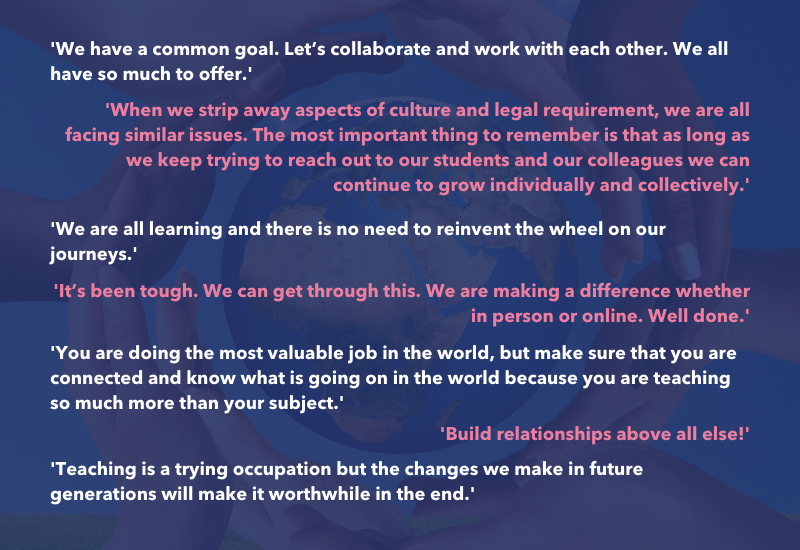For International Day of Education, we reached out to our almost 1,000 international members and affiliates to find out what’s important to them and hear their thoughts and experiences of teaching outside of the UK and Ireland.
When asked why they joined the Chartered College, multiple members mentioned furthering their professional development or having access to research. One member, who teaches in Germany, expressed a desire to remain connected to the UK in order to gain access to ‘good educational research and discussion’. Many others emphasised the importance of connecting with other teachers who share their dedication. A member who teaches in Hong Kong, for example, stated that she joined the Chartered College ‘to be connected to a global network of educators’, while a teacher based in Japan stated that he wanted to ‘connect with other professionals around the world’ and learn ‘different aspects and approaches to education’. Similarly, a member who teaches in Saudi Arabia joined to be part of an organisation ‘whose members are committed to the teaching profession’. In terms of resources, one member stated that they use our resources for lesson planning, while another expressed that the webinars and articles help them with solving problems. One member noted that he shares what he learns from our resources with his colleagues, as well as on his LinkedIn page.
We also wanted to hear what education meant to our international members. Many responses focused on the education of students – for example, one member stated that it’s about ‘nurturing and developing young people’, while another, who teaches in Spain, shared that education is ‘enabling children to reach their individual potential’. Others focused more on the impact education has on society as a whole, for example, one member described education as a ‘systematic framework to provide every person who wants to learn and improve themselves the opportunity to do so.’ One teacher shared that it’s ‘an opportunity to develop oneself’ adding that it’s a ‘platform to develop skills and learn new things’, and another detailed how for them, education is an opportunity to ‘find out what they love’ as well as finding ‘a meaningful way to contribute and earn a living and help them to connect with and understand others’.
Changing Course, Transforming Education
International Day of Education falls annually on the 24th of January and celebrates the role of education in global peace and development, which this year was under the theme of ‘Changing Course, Transforming Education’. So for this, we also asked members what they would like to see change in education internationally. Many highlighted the importance of access to resources, including access to UK research and democratised ‘opportunities for quality pedagogy’. Another member shared how they would like to see more of ‘the world’s education systems become removed from its political systems’, adding that ‘education is too important to be a political football; it’s the foundation of a just, free and compassionate society’. More support and networking for British Schools Overseas (BSO) was also mentioned, with a member teaching in the UAE sharing that teachers working overseas need ‘more relevant articles’. We also heard from a member who wanted to see ‘more harmonisation of qualifications and specifications’, since qualifications should be of ‘equal standing regardless of country’, which currently is not always the case.
Multiple members mentioned collaboration as something needing to change for education internationally. A member based in Hungary stressed the importance of collaborating internationally and how it will aid those areas where ‘international education is behind the times’. Following on from this, we also asked our members how important they think it is for teachers to connect and collaborate internationally. All respondents emphasised the value of this, with members stressing the importance of sharing different cultures as well as practices. One teacher added that this could be a ‘novel solution’ to problems that aren’t currently being solved adequately. Another member pointed out that BSO share the same resources, teachers and challenges as UK schools, and so they must collaborate. Another teacher added that international schools often have greater freedom in their approaches than UK schools, which is something that other schools could learn from. There can be challenges with collaboration, with one member noting that schools often don’t encourage it as they see other schools as competition, suggesting that this mindset needs to change.
Finally, we asked our international members what message they would like to pass on to colleagues across the world. Here’s what they said:

